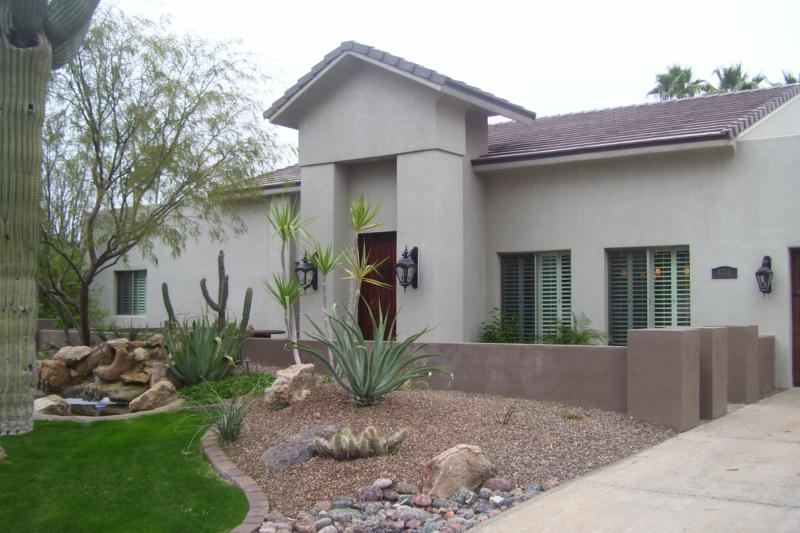
by Paul Slaybaugh | Feb 21, 2011 | Home Buying, Home Selling, Scottsdale Real Estate
When immersing oneself into the home buying or selling process, a consumer will quickly find him or herself inundated with an unfamiliar vernacular:
Realtorspeak
As we in the business have a tendency to forget that not everyone readily understands our acronym-heavy lexicon, the following is the CliffsNotes version of a Scottsdale Real Estate dictionary. Of course, me being me, a few red herrings are included amongst the standard terms you will encounter in your adventure to buy or sell a house to keep you on your toes. See if you can pick them out, and leave me a comment with your guesses.
And as always, kids, we are not attorneys. DO NOT rely on my interpretations of the terms below for legal purpose.
——————————————————————————————————————————————–
AAR – “Arizona Association of Realtors” is the body responsible for the Standard Purchase Agreement that is typically used in residential Real Estate transactions.
Active – A property listing in the MLS that is currently for sale.
Active With Contingency – A property listing in the MLS that is under contract, but accepting backup offers.
Addendum – Document attached to a Purchase Agreement (Contract).
Agency – Fiduciary obligation of a Real Estate Agent (Broker) to represent the best interests of a client in a Real Estate transaction. May be expressed (stated in writing) or implied (through the actions of the agent).
Agent – While the term “Agent” can refer to numerous things, it is most often used in conjunction with a Real Estate transaction to refer to a REALTOR (either a Buyer’s Agent or Listing Agent). SEE ALSO: Real Estate Agent
Appraisal – Valuation of a property’s current worth by an independent professional. An appraisal is part of nearly every financed transaction.
APR – “Annual Percentage Rate” calculates the true cost of borrowing by tallying expenses associated with the loan (closing costs), spreading those costs over the life of the loan, and adding to the rate of interest.
ARM – “Adjustable Rate Mortage”
ARMLS – “Arizona Regional Multiple Listing Service”
“As Is” – Term of a transaction which indicates that the property will convey to the buyer in its present condition, with no repairs required of or agreed to by the seller.
Assessed Value – The basis for property taxes in Maricopa County, as determined by the County Assessor. Assessed Value is calculated at 10% of Full Market Value.
Asset Manager – Person employed by a bank to represent its interests in the sale of property acquired through Trustee’s Sale (Foreclosure).
Bank-Owned Home – See “Foreclosure”
BINSR – “Buyer’s Inspection Notice and Seller’s Response,” standard form used for negotiation of repairs on residential property in AZ.
Blanket Insurance Policy – Insurance coverage that protects the physical structure of a property. Coverage typically extends to the interior studs, leaving drywall, flooring, etc unprotected (unless supplemented with additional coverage).
BPO – A “Broker’s Opinion of Value” is basically a poor man’s appraisal (though we agents are not allowed to refer to our evaluations as “appraisals” as we are not licensed in that field). Primarily used by banks to determine current market value of a property on the cheap (approximately $50-75 versus $350-400). As the name suggests, BPO’s are performed by Real Estate Agents.
Buyer – The person(s) or entity purchasing Real Property.
Buyer’s Agent – Real Estate Agent who represents the Buyer in a Real Estate transaction.
Broker – A Real Estate Broker is an intermediary between a Buyer and Seller in a transaction. Often, there are two Brokers in a Real Estate transaction; one who represents the Seller, and one who represents the Buyer. More often than not, the salespersons with whom the Buyer and Seller interact directly (Buyer’s Agent and Listing Agent respectively) are not the actual Brokers, but agents of the Broker.
Chain of Title – Sequence of title transfers from the present owner back to the original owner.
Client – Principal in a Real Estate transaction (Buyer or Seller) to whom an agent owes a fiduciary obligation.
Closing Costs – Costs due a Buyer or Seller at the Close of Escrow in association with a Real Estate transaction.
CLUE Report – “Comprehensive Loss Underwriting Exchange” details past insurance claims against a property.
CMA – “Comparable Market Analysis” utilized by Real Estate Agents to derive an opinion of a property’s current market value.
COE – Or “Close of Escrow,” is the agreed upon date on which the title (ownership rights) to the property is transferred from Seller to Buyer.
Comps – Short for “Comparable Sales,” recent Comps comprise the linchpin of a property’s current market value.
Contingency – An act upon which a Real Estate transaction is subject, ie: buyer obtaining a loan, the property appraising for the purchase price, buyer selling another property, etc.
Contract – Also known as a “Purchase Agreement,” the legal instrument which states the terms of the agreement to buy/sell between the Buyer and Seller.
Contract Date – The date upon which a Purchase Agreement is fully executed by all parties.
Conventional Loan – Financing vehicle that is not insured or guaranteed by a government agency, and adheres to Fannie Mae (Federal National Mortgage Association) guidelines, with a maximum loan amount of $417,000 in AZ (at the time of this posting).
Counter Offer – A written response that alters one or more terms of an offer to purchase.
Creative Financing – Means of financing the purchase of Real Property that is most likely to result in incarceration.
Cure Notice – Written notice from one party to another during the escrow period of a breach of contract. The breaching party is granted, according to the standard terms of the AAR Purchase Agreement, 3 days to correct the breach before the non-breaching party is permitted to unilaterally cancel the transaction and pursue additional recourse.
Customer – Principal in a Real Estate transaction to whom an Agent (Broker) owes no fiduciary obligation (either represented by another Broker or unrepresented).
Deed of Trust – Legal instrument securing a lender’s interest in a property, included in the closing documents in financed (non-cash) transactions.
Discount Point(s) – Lending fee(s) which may be charged to borrowers with lower credit scores, or at the borrower’s discretion to “buy down” the interest rate. One point is typically equivalent to one percent of the total loan amount.
DOM – “Days On Market” for a listed property.
Dual Agency – The representation of both principals (Buyer and Seller) in a transaction by a single Broker.
Earnest Money / Deposit – “Good Faith” funds, typically deposited with 3rd party title company (or broker’s trust account) upon contractual agreement between Buyer and Seller.
Easement – Right to use of a property for a specific purpose by a party other than the owner, such as a utility company.
Escrow – The process in which title is transferred from the Seller to the Buyer in a Real Estate transaction via neutral third party in accordance with the terms of the Purchase Agreement (Contract).
Escrow Officer – Professional who oversees the Escrow process.
Equity – A homeowner’s financial stake in a property (determined by subtracting existing liens and encumbrances from current market value). ALTERNATE DEFINITION – Something we all once had in far greater supply.
Fair Housing – Doctrine which mandates I not advertise my listings as “FAMILY friendly,” “Within WALKING distance of the SYNAGOGUE,” or “Perfect for RETIREES and EMPTY NESTERS” because the federal government hates target marketing almost as much as it hates me.
Fair Market Value – The price a willing buyer and seller agree to in the open market.
FHA – aka the “Federal Housing Authority,” FHA financing is available for the purchase of a primary residence with a max loan amount of $346,250 (at the time of this posting) in Maricopa County. Property and borrower must meet certain eligibility requirements.
FICOs – Credit scores from the three major reporting bureaus (Experian, Equifax and TransUnion).
Fiduciary – One who is entrusted to represent the best interests of another. In a Real Estate transaction, the fiduciary is the Broker (and agent thereof) who represents a principal (Buyer or Seller).
Final Walkthrough – Buyer’s reinspection of a property immediately prior to the Close of Escrow to ensure that the premises are in substantially the same condition as when the Purchase Agreement was executed, and that any/all agreed upon repairs have been completed to satisfaction.
Financing Contingency – Under the standard AAR Purchase Agreement, a transaction is contingent upon the Buyer’s ability to obtain financing. Unless the boilerplate terms of the agreement have been altered, the Buyer is typically entitled to a full return of the earnest funds if denied for a loan (provided the good faith effort described in the Purchase Agreement has been put forth) at any point prior to the Close of Escrow.
Foreclosure – A bit of a misnomer as properties in AZ are taken back by the bank (or the highest bidder) via “Trustee’s Sale” for non-payment by the mortgagee (homeowner), a Foreclosure property is one which is now owned by the bank or its assignee.
Funding – The lender’s release of closing funds upon full loan approval to the title company.
Fustigate – To beat with a stick. Typically pertaining to Loss Mitigation Specialists and Underwriters in a Real Estate transaction.
Good Faith Estimate – Or “GFE,” is a legally-required estimate of total settlement costs to a Borrower from a Mortgage Lender or Broker.
Guarantee – Distant cousin of the unicorn, this mythical creature does not live inside a Real Estate transaction.
Hardship Letter – A letter, required in a Short Sale transaction, that details the nature of the homeowner’s hardship that necessitates a sale of the property for less than the balance owed on the loan(s).
Hazard Insurance – Required by most lenders, indemnifies against property loss due to nature (fire, storm, etc). Additional coverage may be required for properties that fall within designated disaster areas (flood plains, etc).
HELOC – “Home Equity Line of Credit”
Highest and Best – Solicitation by the Seller, usually in competitive multiple offer scenarios, for a Buyer’s best offer.
HOA – A “Homeowner’s Association” is a governing body (managed either professionally or by the homeowners themselves) that may impose additional rules and bylaws over and above local ordinances to preserve the quality of life and integrity of property values for its members. Periodic fees (monthly, quarterly, semi-annually or annually) are typically levied to support the body and maintain common area elements (community pools, guard gates, clubhouse, foliage, etc). Special assessments can be levied for specific projects over and above the standard operating budget.
Homeowner’s Insurance – Insurance policy that combines hazard coverage with personal liability protection.
Home Warranty – Annual coverage policy for the primary mechanical components of a home, often included in the negotiation between Buyer and Seller.
HUD Home – A property taken over by HUD (Department of Housing and Urban Development) after default on an FHA loan. An FHA loan foreclosure.
HUD-1 Settlement Statement – Itemized list of all costs incurred and funds disbursed at closing.
IDX – “Internet Data Exchange” program that most local Real Estate Brokers participate in, allowing for the proliferation of their ARMLS listings across publicly accessible websites.
Inspection Period – Sometimes referred to as the “Due Dilligence Period,” the Inspection Period typically extends 10 days (negotiable) from full execution of the Purchase Agreement by both parties. During this period, the Buyer is to perform any/all inspections of the property and decide whether to 1) Accept the premises, 2) Request Repairs or 3) Cancel the transaction, provided that none of these options were overridden in the Purchase Agreement.
Interest Rate – The cost of borrowing money for a home loan is based on a percentage rate of interest. While most loan programs offer a fixed rate of interest over the life of the loan, some (ARMs) adjust at specified intervals based on the behavior of a particular index. Most 30 year fixed mortgage rates are driven by ten year, five year and one year Treasury Note yields on the open market, not the fund rate you hear about the FED lowering or raising on the nightly news.
Jumanji – Finding oneself under contract on multiple properties after negotiating offers on more than one at a time.
Jumbo Loan – Financing type that exceeds Fannie Mae conforming loan limits. In AZ, that would be a loan amount in excess of $417,000 presently.
Junior Lien – A lien that is subordinate to a prior lien; ie second mortgages, lines of credit, etc. A junior lienholder is often the fly in the ointment to a successful Short Sale.
Lead-Based Paint Disclosure – Federally required disclosure on all properties built prior to 1978, the year lead was outlawed in paint.
Lease – Rental Agreement for temporary housing.
Lienholder – The financial institution or investor that holds a Deed of Trust.
Listing Agent – Real Estate Agent that represents the Seller in a transaction.
Loan – See “Mortgage”
Lockbox – Key repository used by Real Estate Agents to alternately permit and gain entry into a property.
Loss Mitigation Specialist – AKA “The Anti-Christ,” is the negotiator employed by a bank to represent their interests in a Short Sale transaction.
LSR – A “Loan Status Report” is a buyer pre-qualification form that is attached (typically) to an Offer per the terms of the standard AAR Purchase Agreement.
LTV – “Loan To Value” ratio which outlines down payment requirements for a loan program. For example, an 80/20 LTV reflects a loan for 80% of the value (purchase price), and a 20% down payment from the Buyer.
Mortgage – “Deeds of Trust” are recorded in Arizona instead of Mortgages, but essentially interchangeable terms that refer to the legal instrument used to secure the lender’s interest in the property.
Mortgage Banker – A mortgage professional who works for and sells the financing products of a specific bank.
Mortgage Broker – An intermediary who matches borrowers with financial institutions based on needs and terms. The primary difference between a Mortgage Broker and a Mortgage Banker is that a Broker is not necessarily affiliated with any particular institution.
Negotiation – The attempt to reach an accord between Buyer and Seller on the terms of a Real Estate transaction.
Offer – The initial proposal (must be in writing to be legally recognized) to purchase Real Property; the starting point of a negotiation between Buyer and Seller.
Open House – Four hour blocks of a Listing Agent’s time used to catch up on crossword puzzles.
Origination Fee – Fee which may be charged by a Mortgage Banker or Broker in affiliation with a new loan and included in the Buyer’s closing costs. Most often, an origination fee is equal to 1% of the loan amount.
Pending – An alternate option for a property that is under contract, a listing entered into “Pending” status is effectively removed from the market (not soliciting backup offers) while escrow is navigated.
Personal Property – Affects of a homeowner that are not considered Real Property, and therefore, do not transfer upon sale unless specified in the Purchase Agreement. Basic rule of thumb for Arizona holds that anything that requires a tool to remove from the home is considered a fixture of the house, and conveys unless excluded. Notably, refrigerators and washers/dryers are personal property in AZ.
PITI – “Principal, Interest, Taxes and Insurance” of which a monthly mortgage payment is comprised.
PMI – Private Mortgage Insurance, required on loans with down payments less than 20% of the purchase price.
Preliminary Title Report – Report that lists conditions of obtaining title insurance and any exceptions to the policy’s coverage.
Primary Lienholder – The lienholder in first position on a property, often the holder of the Deed of Trust.
Primary Residence – Where you hang your hat, for financing and tax purposes.
Property Taxes – Taxes levied annually and paid semi-annually in conjunction with the ownership of Real Property in AZ. Total tax liability is determined by multiplying a property’s assessed value (10% of True Market Value, as determined by the County Assessor’s Office) by a municipality’s current tax rate.
Purchase Agreement – See Contract
Quitclaim Deem – Transfer of interest in a property from one party to another without warranty.
Real Estate Agent – A person licensed to transact in the sale of Real Property.
REALTOR® – Real Estate Agent who is an active member of the National Association of Realtors. All Realtors are Real Estate Agents, but not all Real Estate Agents are necessarily Realtors.
Real Property – Land and its appurtenances plus the physical improvements (structures) made to a property.
Recording – The recordation of the warranty deed (conveying title from Seller to Buyer) at the county recorder’s office signifies the official Close of Escrow in Arizona.
REO – “Real Estate Owned” AKA Foreclosure or Bank-Owned Property.
Renter’s Insurance – Otherwise known as “Content Insurance,” this type of coverage protects personal affects.
RESPA – “Real Estate Settlement Procedures Act” that establishes consumer protections in a Real Estate transaction, including measures to ensure proper disclosure of estimated settlement fees, and prohibitions on kickbacks from service providers that may increase total settlement costs.
Riparian Rights – System for allocating water rights that AZ Realtors learn about in licensing coursework and then summarily forget. This is the desert, people. We don’t own squat.
Schedule B – List of exceptions to coverage in a Title Report
Seller – The person(s) or entity selling Real Property.
Short Sale – A Real Estate transaction in which the total lien(s) against a property exceed its current market value. Approval must be gained from the lienholder(s) to accept repayment in an amount less than owed in exchange for the lien’s release. With a host of possible legal and tax ramifications, consultation with a Real Estate attorney is strongly advised before a Seller pursue a short sale.
SPDS – “Seller Property Disclosure Statement” which outlines the Seller’s knowledge of the property’s history, and is given to the buyer within 5 days of contract acceptance under the terms of the standard AAR Purchase Agreement. Such disclosures are rarely available for bank-owned properties, thus this provision is often stricken from the agreement on REO transactions.
Subprime Loan – A financing option for borrowers who don’t qualify for traditional mortgage programs that is presently about as viable as Justin Bieber’s impending induction into the Rock and Roll Hall of Fame.
Title – Bundle of rights that accompanies ownership (either whole or partial) interest in a property.
Title Agent – Third party responsible for underwriting a title insurance policy. The term is often used interchangeably with “Escrow Agent” in AZ, but the two are not necessarily the same.
Title Insurance – Coverage supplied by a Title Agent that warrants clear title to a property (less any listed exceptions of the policy). Separate policies are available to protect the interests of homeowners and lenders.
Trustee – Third party to whom a property is entrusted for the protection of a beneficiary.
Trustee’s Sale – Sale of a property under the terms of a Deed of Trust as a remedy for default in Arizona. The artist otherwise known as “Foreclosure.”
Underwater – Slang reference for a home loan whose balance exceeds the current market value of the property.
Underwriter – The professional responsible for final review of a Buyer’s loan package and underwriting of the closing documents.
Usain Bolt – Jamaican speedster who is considerably faster than the housing recovery.
VA Loan – Financing type available to veterans.
Vacant – Terminology used to describe an undeveloped lot or an unoccupied home.
Vesting – Manner in which title to a property is taken. Standard options include “Sole and Separate Property,” “Joint Tenancy,” “Tenants In Common,” “Community Property” and “Community Property with Right of Survivorship.” As there are potential legal and tax ramifications to the option selected, seeking the advice of an attorney and/or CPA is recommended.
Zestimate – A continual source of amusement for Real Estate Agents.
by Paul Slaybaugh | Feb 16, 2011 | Home Buying, Scottsdale Real Estate

Gonna Save Money By Renting, Eh?
I find myself working the Scottsdale rental market more often these days than in years past. With a large percentage of the populace having been converted from homeowner to renter after selling a home short or losing it to foreclosure (thus, effectively eliminating themselves from the buyer pool for the foreseeable future due to credit damage and/or home ownership malaise), and would-be sellers opting to lease their current homes out rather than taking a huge equity bath if circumstances force a move, it’s an arena in which Realtors are currently in high demand. So it was that I was researching rental home availability for a couple of clients this afternoon in the McCormick Ranch area.
While I’ve been aware of a diminished number of available rental properties coinciding with rising rents for some time now, I was shocked by the dearth of options I turned up in ordinarily easy to fit parameters.
For instance, there are exactly ZERO active unfurnished, single-family home listings in the 85258 zip code (McCormick Ranch, Scottsdale Ranch, Gainey Ranch, etc) for lease under $2000 a month at present. None, zilch, nada. This in a zip code that has fetched an average price per square foot of $164.89 for single family homes in the past six months (Aug 16, 2010 – Feb 16, 2011) .
Extrapolating the sales price of a 3 bedroom, 1800 square foot house based on that per foot average, current resale market value would be approximately $296,892 without adjusting for +/- factors.
Intrigued, I was drawn to crunch the affordability numbers on such a property.
Given that many buyers today are trying to get a foot in the door for the least amount of up front expense as possible, let’s pre-suppose a 3.5% down payment for a 30 year, fixed FHA loan. Assuming an interest rate in the 5.25% range, and tacking on the additional .5% for monthly PMI, the principal and interest payments on a loan balance of $286,501 at 5.75% is $1671.94. Add in property tax and insurance estimates of approximately $170 and $70 respectively for a total monthly PITI payment of $1911.94. Throw in the $15/month McCormick Ranch POA dues, and you are sitting on an approximate monthly outlay of $1926.94.
It should go without saying that figure decreases with a larger down payment.
A twenty percent down conventional borrower, for example, avoids the monthly mortgage insurance, thereby getting a significantly better annual percentage rate (credit and all other factors being equal) to coincide with the lower principal balance.
Now to rent this same property, back to the MLS we go.
If you were in the market to lease an unfurnished, single-family home in 85258 today, you would have exactly six choices: the cheapest of which is a 1900 square footer currently listed for $2195/month in McCormick Ranch. It bears repeating that the CHEAPEST available rental property in the category today costs almost $300 more per month (less potential maintenance costs of home ownership, but also ignoring potential tax benefits) than it would to purchase the same house with the lowest down payment available to most borrowers.
That is staggering.
Thinking the paltry number of available rentals might be an anomaly confined to a sought after zip code, I delved into the cheaper, neighboring zips of 85250 and 85251 in South Scottsdale. Going back just six months ago, a prospective tenant had his/her choice of remodeled 1950s-1960s ranch homes in the $800-1500 / month range. After all, these are zip codes in which a single-family, 3 bedroom, 1500 square foot home can be had in the 150-175k range these days.
The current rental inventory?
- There are 2 single-family homes for lease under $1500/month in 85250.
- There are 5 single-family homes for lease under $1500 / month in 85251.
_____________________________________________________________________________
Want to do you're own sleuthing?
Make your own comparisons by searching the current inventory.
Scottsdale Rental Homes | Scottsdale Homes for Sale
_____________________________________________________________________________
There is no moral of the story other than the context given to recent reports that tout home ownership in Scottsdale as having surpassed renting in affordability. I treat all such reports with healthy skepticism, as one must always question the source as well as the metrics used, but this is some news that actually jives with what I am seeing in the trenches. Much as it reads like more hot air designed to spur consumer confidence, there is merit to the attention given the growing disconnect between housing values and rental rates.
 It’s a good time to be a landlord.
It’s a good time to be a landlord.
If nothing else, it will be interesting to see what effect, if any, this trend has on strategic defaults and short sales. Homeowners who are confident that ample affordable rental options await them may have to think a bit longer and harder before walking away from an underwater mortgage if the monthly payment is still manageable (homeowners who walk more from the distaste for lost value than ability to pay, in other words). On top of the higher rents, the reduced competition allows a landlord to be pickier with the choice of tenant. Recent credit / financial woes are only overlooked to the extent of one’s prospects. When there are 10 houses to every renter, it’s easy to find a forgiving landlord. But when there are 10 renters to every home … not so much.
Long essay short, a homeowner may want to do some additional research before opting to become a former homeowner. There is danger of jumping out of the frying pan and into the fire if precautions haven’t been taken to ensure that a markedly better living situation awaits.
While it has become an Olympic sport to predict the direction of the market with downward pressure on pricing here, and upward pressure on rates there, I’ll leave the prognosticating to the eggheads in the ivory tower. I will go on record saying this, however:
Prices are falling and rents are rising. Do the math.
Buy. Scottsdale. Real Estate. Now.








